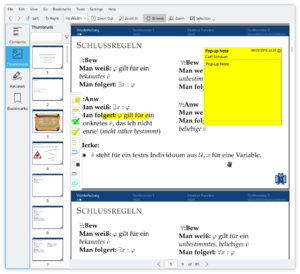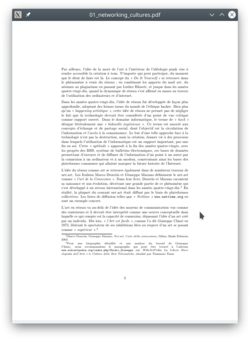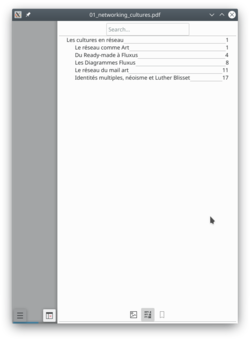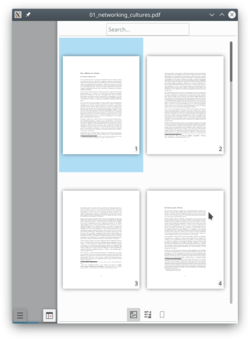Okular/it: Difference between revisions
Updating to match new version of source page |
Created page with "{{GrafBreadCrumbs|1=Okular}}" |
||
| Line 1: | Line 1: | ||
<languages /> | <languages /> | ||
{{GrafBreadCrumbs|1=Okular}} | |||
<span id="What_is_Okular?"></span> | |||
==Cos'è Okular?== | ==Cos'è Okular?== | ||
| Line 6: | Line 9: | ||
Puoi seguire lo sviluppo sulla [http://okular.kde.org/ pagina principale] del progetto. | Puoi seguire lo sviluppo sulla [http://okular.kde.org/ pagina principale] del progetto. | ||
<span id="Background"></span> | |||
==Informazioni== | ==Informazioni== | ||
<div class="mw-translate-fuzzy"> | |||
Il suo sviluppo è iniziato tramite Google's Summer of Code. La descrizione del progetto è disponibile nel [http://developer.kde.org/summerofcode/okular.html KDE Developer's Corner]. | |||
</div> | |||
<div class="mw-translate-fuzzy"> | |||
Okular combina le eccellenti funzionalità di [[Special:myLanguage/KPDF|KPDF]] con la versatilità del supporto a diversi tipi di documenti come PDF, Postscript, DjVu, CHM e altri. | |||
</div> | |||
<div class="mw-translate-fuzzy"> | |||
La [http://okular.kde.org/formats.php pagina dei formati supportati] presenta un grafico che descrive in maggior dettaglio i formati supportati e le caratteristiche supportate per ciascuno di essi. | |||
</div> | |||
[[Image:Okular-annotations.png|thumb|300px|center| | <div class="mw-translate-fuzzy"> | ||
[[Image:Okular-annotations.png|thumb|300px|center|Creare un annotazione in Okular]] | |||
</div> | |||
<div class="mw-translate-fuzzy"> | |||
Oltre a supportare molti formati, '''Okular''' offre funzionalità come la selezione del testo, la creazione di annotazioni, l'estrazione dei file integrati all'interno di un documento e tante altre sorprese. Schermate di '''Okular''' in azione sono visibili [http://okular.kde.org/screenshots.php qui]. | |||
</div> | |||
Puoi comunicare con gli sviluppatori e gli altri utenti su IRC, irc.freenode.org, canale [irc://irc.kde.org/#okular #okular]. | Puoi comunicare con gli sviluppatori e gli altri utenti su IRC, irc.freenode.org, canale [irc://irc.kde.org/#okular #okular]. | ||
<div class="mw-translate-fuzzy"> | |||
Se sei interessato a contribuire allo sviluppo di '''Okular''', [http://okular.kde.org/contact.php contatta gli sviluppatori]. Programmatori e altri volontari sono benvenuti. | |||
</div> | |||
== Mobile Version == | == Mobile Version == | ||
| Line 34: | Line 50: | ||
You can test the mobile version in your PC by entering {{Input|1=okularkirigami}} in your [[Special:myLanguage/Tutorials/Open a console|terminal]]. A nightly android version is also available at the KDE [https://binary-factory.kde.org/view/Android/job/Okular_android/ binary factory]. | You can test the mobile version in your PC by entering {{Input|1=okularkirigami}} in your [[Special:myLanguage/Tutorials/Open a console|terminal]]. A nightly android version is also available at the KDE [https://binary-factory.kde.org/view/Android/job/Okular_android/ binary factory]. | ||
<span id="Hints_and_Tips"></span> | |||
==Consigli e suggerimenti== | ==Consigli e suggerimenti== | ||
=== | <span id="Reviewing_Documents_/_Annotations"></span> | ||
<div class="mw-translate-fuzzy"> | |||
=== Revisione dei documenti === | |||
</div> | |||
<div class="mw-translate-fuzzy"> | |||
Facendo doppio clic su uno degli strumenti di '''Revisione''' (<keycap>F6</keycap>) è possibile creare annotazioni multiple senza dover riattivare lo strumento dopo la prima volta. | |||
</div> | |||
How to keep the annotations you made to the PDF file: | How to keep the annotations you made to the PDF file: | ||
| Line 60: | Line 82: | ||
* [https://okular.kde.org/ Okular website] | * [https://okular.kde.org/ Okular website] | ||
* [https://api.kde.org/okular/html/index.html Okular API documentation] | * [https://api.kde.org/okular/html/index.html Okular API documentation] | ||
* [https:// | * [https://invent.kde.org/graphics/okular Okular git repository] | ||
== References == | == References == | ||
<div class="mw-translate-fuzzy"> | |||
[[Category:Grafica/it]] | [[Category:Grafica/it]] | ||
</div> | |||
Revision as of 12:43, 4 August 2024
Home » Applications » Graphics » Okular
Cos'è Okular?
Okular is a universal document viewer developed by KDE. Okular works on multiple platforms, including but not limited to Linux, Windows, Mac OS X, *BSD, etc.
Puoi seguire lo sviluppo sulla pagina principale del progetto.
Informazioni
Il suo sviluppo è iniziato tramite Google's Summer of Code. La descrizione del progetto è disponibile nel KDE Developer's Corner.
Okular combina le eccellenti funzionalità di KPDF con la versatilità del supporto a diversi tipi di documenti come PDF, Postscript, DjVu, CHM e altri.
La pagina dei formati supportati presenta un grafico che descrive in maggior dettaglio i formati supportati e le caratteristiche supportate per ciascuno di essi.
Oltre a supportare molti formati, Okular offre funzionalità come la selezione del testo, la creazione di annotazioni, l'estrazione dei file integrati all'interno di un documento e tante altre sorprese. Schermate di Okular in azione sono visibili qui.
Puoi comunicare con gli sviluppatori e gli altri utenti su IRC, irc.freenode.org, canale #okular.
Se sei interessato a contribuire allo sviluppo di Okular, contatta gli sviluppatori. Programmatori e altri volontari sono benvenuti.
Mobile Version
Okular has a mobile version since version 0.16 release in February 2013 [1]. The first version was based on the active framework. The mobile viewer was then ported to Kirigami in 2016 by Marco Martin[2] and finally to Kirigami2 in 2017[3].
The mobile version doesn't support all features from the desktop version, but provide better touch support and a mobile interface.
You can test the mobile version in your PC by entering
okularkirigami
in your terminal. A nightly android version is also available at the KDE binary factory.
Consigli e suggerimenti
Revisione dei documenti
Facendo doppio clic su uno degli strumenti di Revisione (F6) è possibile creare annotazioni multiple senza dover riattivare lo strumento dopo la prima volta.
How to keep the annotations you made to the PDF file:
By default, Okular saves annotations in the local data directory for each user. Since KDE 4.9, it's optionally possible to store them directly in a PDF file by choosing , so they can be seen in other PDF viewers. Note that this feature requires Poppler 0.20 or newer for regular PDF documents. If the PDF document you are annotating is encrypted, this feature requires Poppler 0.22 or newer.
DRM
By default, Okular follows the PDF specification and don't allow copying text from DRM protected files. However, there is an option in the settings to disable DRM limitations in
There was a small controversy in the Debian bug tracker a long time ago, about the default choice to Obey DRM limitations[4][5]. The choice was then explained by an Okular/KPdf developer[6].
PDF Signature and certificate
Okular can verify if a PDF certificate is valid. But you can not yet create a new signature. See the release note for more information.




